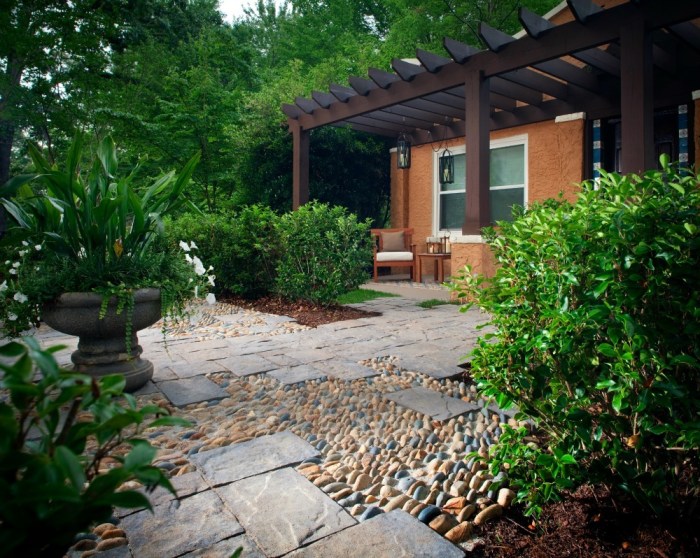Delving into the realm of acoustics, we embark on a journey to unravel the intriguing question: do trees block sound? From bustling city streets to serene natural landscapes, trees stand as potential guardians against noise pollution, inviting us to explore their remarkable sound-absorbing capabilities.
As nature’s sound engineers, trees possess an inherent ability to absorb and reflect sound waves, shaping the acoustic environment around us. Their intricate structures and diverse characteristics play a crucial role in determining their effectiveness as sound barriers, making them valuable allies in the fight against excessive noise.
Introduction: Do Trees Block Sound
Sound waves, a form of mechanical energy, travel through the air as vibrations. They can be absorbed, reflected, or transmitted by objects in their path. Trees, with their vast canopies and complex structures, play a significant role in shaping the acoustic environment by absorbing and reflecting sound.
Trees contribute to the overall health and well-being of our environment. They provide shade, purify air, reduce soil erosion, and support wildlife. Additionally, trees can serve as effective sound barriers, mitigating noise pollution and creating more peaceful and enjoyable outdoor spaces.
Tree Characteristics Affecting Sound Blocking
The effectiveness of trees in blocking sound depends on several factors, including their species, leaf density, and canopy shape.
Tree Species
Different tree species have varying sound-absorbing and reflecting capabilities. Deciduous trees, such as oaks and maples, have broad leaves that absorb sound effectively. Coniferous trees, like pines and firs, have needle-like leaves that reflect sound more.
Leaf Density and Canopy Shape
Trees with dense foliage, such as evergreens, are more effective at absorbing sound than trees with sparse foliage. Canopy shape also plays a role. Trees with wide, spreading canopies provide more surface area for sound absorption.
Factors Influencing Sound Blocking Effectiveness

In addition to tree characteristics, several other factors influence the effectiveness of trees for sound blocking.
Tree Size and Height
Larger trees with greater height provide more surface area for sound absorption. Taller trees can also create a more effective barrier to sound.
Distance between Trees and Sound Sources
The distance between trees and sound sources impacts the effectiveness of sound blocking. Trees planted closer to sound sources provide better attenuation.
Surrounding Vegetation and Topography
The presence of other vegetation and the surrounding topography can affect sound propagation. Dense vegetation and hilly terrain can help to absorb and deflect sound.
Applications of Tree Sound Blocking

Trees can be used in various applications to reduce noise pollution and enhance sound quality.
Noise Reduction in Urban Areas
Planting trees along highways and around airports can help to mitigate traffic and aircraft noise. Trees create a physical barrier that absorbs and deflects sound.
Acoustic Barriers in Parks and Outdoor Spaces
Trees can be planted to create acoustic barriers in parks and other outdoor spaces, providing respite from noise and creating more tranquil environments.
Sound Quality Enhancement in Concert Halls and Performance Venues
Trees can be used to enhance sound quality in concert halls and other performance venues. The foliage and canopy of trees can help to absorb and diffuse sound, reducing reverberation and creating a more balanced acoustic environment.
Limitations and Considerations

While trees can be effective for sound blocking, there are some limitations and considerations to keep in mind.
Wind and Weather Conditions, Do trees block sound
Wind and weather conditions can affect the effectiveness of trees for sound blocking. Strong winds can cause leaves to rustle and branches to sway, generating noise. Heavy rain or snow can also reduce the sound-absorbing capabilities of trees.
Impact on Other Environmental Factors
Planting trees for sound blocking should be balanced with other environmental considerations. Trees can block sunlight, affecting plant growth and wildlife. Careful planning and selection of tree species are essential to minimize potential negative impacts.
Recommendations for Optimal Sound Blocking
For optimal sound-blocking results, consider the following recommendations:
- Plant trees with dense foliage and wide canopies.
- Plant trees close to sound sources.
- Consider planting a variety of tree species to enhance sound absorption and reflection.
- Maintain trees regularly to ensure their health and effectiveness.
FAQ Guide
Do all trees block sound equally?
No, different tree species exhibit varying degrees of sound-blocking capabilities. Factors such as leaf density, canopy shape, and tree size influence their effectiveness.
How far away from a sound source should trees be planted for optimal sound blocking?
The ideal distance depends on the tree species, height, and surrounding environment. Generally, a distance of at least 50 feet is recommended for significant noise reduction.
Can trees help improve sound quality in concert halls?
Yes, trees planted around concert halls can absorb and scatter sound waves, reducing reverberation and enhancing the overall sound quality within the venue.
